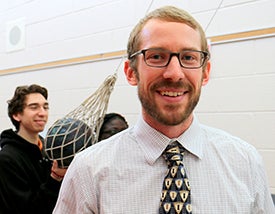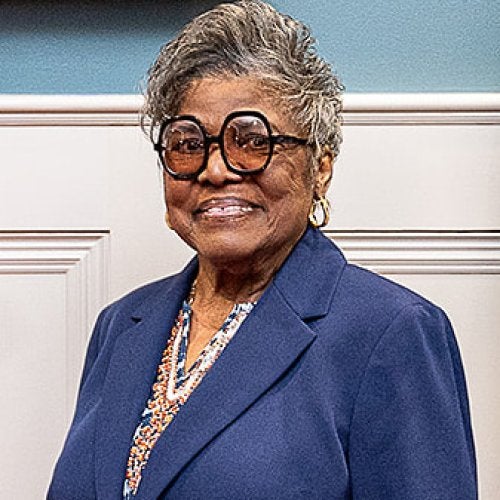
“The first year of the program is going well,” Jerick says. “Lately, we have focused on the Next Generation Science Standards (NGSS). My cohort has been collaborating to master our understanding of the standards while gathering in our content areas to explore implementation of the standards in our classrooms. Within our content groups, we develop lessons both together and on our own, focusing on these standards.”
Collaboration is a cornerstone of the KSTF fellowship program, which seeks to shape “teacher leaders.” As KSTF notes in its selection criteria for fellows, “Teacher leaders are first and foremost outstanding teachers who have the curiosity, vision, and drive to work with others to understand and improve teaching practice in ever-wider circles of influence.” The program’s strong collaborative spirit has deeply impressed Jerick.
“After teaching our newly created lessons,” he says, “our content group holds a Google Hangout to reflect, ask each other questions, and learn on a deeper level about our own lesson as well as ideas and best practices from others’ lessons. I’ve enjoyed seeing my pedagogical skills improve by reflecting with my content group on how their lessons and interpretations of the standards are implemented. It’s exciting to share the materials and lessons I’ve created, and then it’s icing on the cake to receive feedback, insights, and questions from other professionals.”
Recognition of teachers as professionals is an issue very dear to Jerick. His passion to teach – following what he calls his true values – drew him away from a more lucrative career in consulting. He recalls that, when he worked for the firm Accenture, he was treated as a professional every day. But since graduating with a focus in Secondary Science Education from the College of Education’s Maryland Master of Education with Certification (MCERT) program almost two years ago, he has not seen the same respect for people in his new profession.
“This is a systemic issue in American education and a product of our overarching cultural values,” Jerick observes. “As with any profession, there are people in this field who do not act like professionals. Unfortunately, their actions tend to be publicized, giving the entire field an unwarranted stereotype. This isn’t to say things aren’t getting better, because I know conditions are improving.”
Strengthening the teaching profession is one goal of KSTF, which regards itself as an incubator for early-career teachers. Its teaching fellowships are designed to support beginning high school teachers, according to the selection criteria: “We do not expect candidates to display a mastery of teaching when they apply. Rather, we are seeking candidates who understand that teaching is highly complex, intellectually challenging work, and [who] recognize that, regardless of other experiences they may have had, it will take them considerable time and effort to become outstanding teachers.”
The emphasis on professional development in the KSTF Teaching Fellows Program is in part why teacher educators at the College of Education recommend it to graduates heading into STEM teaching, says Dr. Daniel Levin, who instructed Jerick in his secondary science teaching methods course in the MCERT program.
“Quality professional development, like that offered by Knowles, supports teachers in continuing to examine their students’ learning and their instructional practice,” Dr. Levin notes. “Without this kind of ongoing support, teachers often focus only on the institutional priorities communicated to them by administrators and other school leaders. In many cases, these leaders don’t have a clear picture of important science learning outcomes. And so ongoing professional development, in which teachers collaborate with each other and with experts in science education to examine student work and teaching practice, is crucial.”
The professional development offered by the Knowles Science Teaching Foundation dovetails naturally with the teacher education program that Jerick attended at the University of Maryland. Dr. Levin describes the Secondary Science Education program as focused on helping prospective teachers learn to attend and respond to the substance of their students’ thinking.
“Students bring ideas and reasoning to science classrooms that can be leveraged to support their further science learning,” Dr. Levin explains. “We concentrate on helping teacher candidates learn to listen to their students’ thinking and make connections to help them build science proficiency.”
The KSTF fellowship program is just one of many opportunities that teacher candidates become aware of through resources at the College of Education. According to Dr. Ebony Terrell Shockley, who directs the MCERT program and the Office of Teacher and Leader Education (OTLE), the College also informs students of career fairs and job vacancies, provides seminars on building a teaching career, and invites UMD Career Center staff to speak to students. Perhaps most helpfully, the College invites human resources officers from local school districts to interview students on campus.
In future years of the KSTF fellowship program, Jerick will work with other fellows to hone exemplary teaching practices, explore ways to use student data to improve instruction and learning, and deepen his understanding of the complexity and power of collaborative working relationships, especially in the context of his school community. After completing the fifth year, he will become a Senior Fellow, eligible for continued support while pursuing National Board Certification and for leadership grants to pursue projects that impact education on a larger scale. KSTF also encourages Senior Fellows to stay involved in the program by designing and delivering professional development to future Teaching Fellows.
For now, Jerick intends to keep sharpening his teaching skills in order to make impacts in his physics classroom at T. C. Williams High School. He also sponsors the school’s Ultimate Frisbee Club and its chapter of Students Opposing Slavery, which raises awareness of human trafficking and empowers youth leaders in the anti-trafficking movement. Jerick’s care for social justice issues is unsurprising for a graduate of the College of Education, where several scholars address social justice issues as they relate to schooling. He says his most eye-opening experience as an early-career teacher has been discovering the vast disparities between schools in different American communities.
“I would love for every student in the U.S. to have access to the same educational foundation, and this clearly doesn’t happen,” he says. “Some public schools seem to have everything, whereas others lack what I would say are essential resources. It’s extremely sad that one’s quality of education depends on the luck of being born in the right place or in the ‘right’ family. I feel this is a failure of our society.”
Learn more about the KSTF Teaching Fellows Program at kstf.org.
Jerick Wilson matriculated in the MCERT program in Secondary Science Education in the Department of Teaching and Learning, Policy and Leadership. He teaches physics and AP physics at T. C. Williams High School in the Alexandria City Public Schools.
Dr. Daniel Levin, a clinical assistant professor in the Department of Teaching and Learning, Policy and Leadership, coordinates the undergraduate and graduate middle school science and mathematics teacher education programs, as well as a program to prepare practicing elementary teachers to earn an add-on endorsement in elementary STEM education. He taught secondary science for nine years in public schools in the Washington, D.C. area. His research examines responsive science teaching, formative assessment, socio-scientific issues, science and mathematics teacher education, and students’ engagement in scientific practices.
Dr. Ebony Terrell Shockley is the director of the Maryland Master of Education with Certification (MCERT) program, the director of the Office of Teacher and Leader Education (OTLE), and a clinical assistant professor in the Department of Teaching and Learning, Policy and Leadership. She is a researcher in minority and urban education, focusing on disciplinary and digital literacy (particularly in secondary science education), sociolinguistics and dialect education, and cultural factors affecting student outcomes on formal and informal assessments. Dr. Shockley is the author of The Pilot (BookSurge, 2008), a children’s book offering a glimpse of New York City in the aftermath of September 11th.



